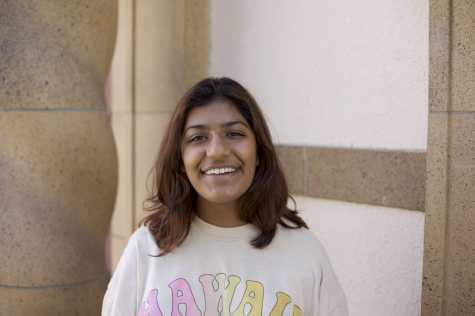Local eating disorder specialist gives advice for the holidays
December 7, 2021
Content warning: Discussion of eating disorders
Between Thanksgiving with its giant feasts, Christmas and Hanukkah with their food-filled festivities, and New Year’s Eve with its parties, food defines the holiday season. For many students, these holidays bring much-needed joy and fun to an otherwise stressful finals season. However, for those with eating disorders, navigating the holidays can be a nightmare.
According to a study published in November 2020 in the weekly culture magazine, People, 47% of 2,000 polled Americans experience “food stress” around the holidays, and 48% agreed with the statement that “Foods [were] a bigger stressor for them than family dynamics or gift-giving.”
This is just the average, diet-culture-affected American. For those with eating disorders, this stress can be even worse.
According to Wendy Sterling, a Bay Area eating disorder expert and sports dietitian, the pressure from peers and family can contribute significantly to unhealthy food behaviors around the holidays.
“It’s all too common to hear people talking casually about the latest diet trend, or food group they omitted or diet they started,” Sterling said. “This can be triggering to our patients, who are working hard to reestablish their own relationship[s] with food.”
Sterling also said that reuniting with family can trigger insecurities around food and body image.
“Family members and patients themselves may become more self-conscious as they gather with loved ones with whom they haven’t seen in awhile,” Sterling said. “There may be an increase in stress around eating in front of others, or fear around what family members might say about their plates of food, or about their bodies.”
For students struggling during these next few weeks, Sterling advises tuning out the diet culture.
“Usually for my patients, they have learned a lot in treatment about what that [healthy] is: regular and consistent meals, full plates, and try not to let the ‘noise’ bother you,” Sterling said.
The National Eating Disorders Association recommends brainstorming conversation topics ahead of the time in order to direct conversation away from food, and to keep chatter going, in order to distract yourself from your anxiety around food.
NEDA also suggests to identify the eating disorder-related thoughts and rationalize your way out of them.
Teachers can also help support students with eating disorders. Sterling said teachers can help by not giving projects centered around weight or food tracking.
“Teachers should avoid giving kids projects that center around body composition, weight or calorie based assessments,” Sterling said. “This inevitably causes harmful comparisons that my patients point to years later or intense preoccupations. This would ideally apply year-round, and not just over the holidays.”
According to Sterling, students can also help their peers with eating disorders by offering support, friendship, and distraction from food and exercise.
“Offer friendship, support, and to talk if friends need a distraction from the holiday craziness,” Sterling said. “And keep conversations about topics other than body, weight, shape, calories, and food!”
If you feel that food is a stressor for you around the holidays, even if you don’t have an eating disorder, you should always reach out for help.
——————————————
National crisis hotline:
- CALL (800) 273-TALK
- TEXT HOME to 741-741
National eating disorder association:
- CALL 1-800-931-2237
- TEXT NEDA to 741-741
- CHAT at https://chatserver.comm100.com/ChatWindow.aspx?siteId=144464&planId=467&visitType=1&byHref=1&partnerId=-1


